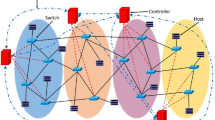Abstract
Many application domains are increasingly leveraging service-oriented architecture (SOA) techniques to facilitate rapid system deployment. Many of these applications are time-critical and, hence, real-time assurance is an essential step in the service composition process. However, there are gaps in existing service composition techniques for real-time systems. First, admission control is an essential technique to assure the time bound for service execution, but most of the service composition techniques for real-time systems do not take admission control into account. A service may be selected for a workflow during the composition phase, but then during the grounding phase, the concrete service may not be able to admit the workload. Thus, the entire composition process may have to be repeated. Second, communication time is an important factor in real-time SOA, but most of the existing works do not consider how to obtain the communication latencies between services during the composition phase. It is clear that maintaining a full table of communication latencies for all pairs of services is infeasible. Obtaining communication latencies between candidate services during the composition phase can also be costly, since many candidate services may not be used for grounding. Thus, some mechanism is needed for estimating the communication latency for composite services. In this paper, we propose a three-phase composition approach to address the above issues. In this approach, we first use a highly efficient but moderately accurate algorithm to eliminate most of the candidate compositions based on estimated communication latencies and assured service response latency. Then, a more accurate timing prediction is performed on a small number of selected compositions in the second phase based on confirmed admission and actual communication latency. In the third phase, specific concrete services are selected for grounding, and admissions are actually performed. The approach is scalable and can effectively achieve service composition for satisfying real-time requirements. Experimental studies show that the three-phase approach does improve the effectiveness and time for service composition in SOA real-time systems. In order to support the new composition approach, it is necessary to effectively specify the needed information. In this paper, we also present the specification model for timing-related information and the extension of OWL-S to support this specification model.
Similar content being viewed by others
References
Aggarwal R, Verma K, Miller JA, Milnor W (2004) Constraint driven web service composition in METEOR-S. IEEE Int Conf Serv Comput
Badidi E, Esmahi L, Serhani MA (2005) A queuing model for service selection of multi-classes QoS-aware web services. IEEE Eur Conf Web Serv
Catley C, Petriu DC, Frize M (2004) Software performance engineering of a web services-based clinical decision support infrastructure. Int Workshop Softw Perform 130–138
Chandrasekaran S, Miller J, Silver G, Arpinar B, Sheth A (2003) Performance analysis and simulation of composite web services. Int J Electron Commer Bus Media 13(2): 18–30
D’Ambrogio A (2006) A model-driven WSDL extension for describing the QoS of web services. IEEE ICWS
D’Ambrogio A, Bocciarelli P (2007) A model-driven approach to describe and predict the performance of composite services. In: Proceedings of the 6th international workshop on software and performance table of contents
Dong J, Sun YT, Yang S (2006) OWL-S ontology framework extension for dynamic web service composition. IEEE SEKE
Erradi A, Padmanabhuni S, Varadharajan N (2006) Differential QoS support in web services management. IEEE Int Conf Web Serv 781–788
Litoiu M (2004) Migrating to web services: a performance engineering approach. J Softw Maint Evol Res Pract 16
Liu X, Heo J, Sha L, Zhu X (2006) Adaptive control of multi-tiered web application using queueing predictor. IEEE/IFIP Network Operations and Management Symposium, Vancouver
Ma H, Yen I-L, Zhou J, Cooper K (2006) QoS analysis for component-based embedded software: model and methodology. J Syst Softw, Elsevier 79(6): 859–870
Yu-jie M, Jian C, Shen-sheng Z, Jian-hong Z (2005) Interactive web service choice-making based on extended QoS model. Int Conf Comput Inf Technol
Ran S (2003) A model for web sevices discovery with QoS. ACM SIGEcom Exch 4(1): 1–10
Silver GA, Maduko A, Jafri R, Miller JA, Sheth AP (2003) Modeling and simulation of quality of service for composite web Services. World Multiconference on Systemics, Cybernetics, and Informatics, Orlando, Florida 420–425
Tian M, Gramm A, Ritter H, Schiller J (2004) A survey of current approaches towards specification and management of quality of service for web services. PIK J 3: 132–139
Ye Y, Yen I-L, Xiao L, Thuraisingham B (2008) Secure, highly available, and high performance peer-to-peer storage systems. IEEE Int Conf High Assur Syst Eng
Yu T, Zhang Y, Lin K-J (2007) Efficient algorithms for Web Services selection with end-to-end QoS constraints. ACM Trans Web 1(1)
Zeng L, Benatallah B, Dumas M, Kalagnanam J, Sheng Q (2003) Quality driven web services composition. WWW 2003 411–421
Zeng L, Benatallah B, Ngu AHH, Dumas M, Kalagnanam J, Chang H (2004) QoS-aware middleware for web services composition. IEEE Trans Softw Eng 30(5)
Zhang H, Goel A, Govindan R (2005) An empirical evaluation of internet latency expansion. ACM SIGCOMM Comput Commun Rev
Author information
Authors and Affiliations
Corresponding author
Rights and permissions
About this article
Cite this article
Moussa, H., Gao, T., Yen, IL. et al. Toward effective service composition for real-time SOA-based systems. SOCA 4, 17–31 (2010). https://doi.org/10.1007/s11761-010-0057-4
Received:
Revised:
Accepted:
Published:
Issue Date:
DOI: https://doi.org/10.1007/s11761-010-0057-4




